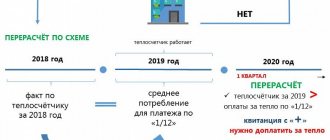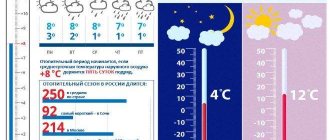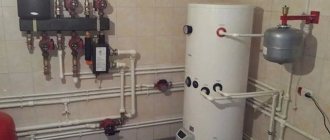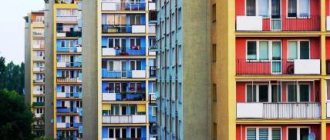Russians were warned about an increase in payments for housing and communal services in February
In February, management or resource supply organizations must issue a recalculation for heating based on the results of reconciliation in January. A member of the Committee of the Russian Chamber of Commerce and Industry on Entrepreneurship in the Housing and Public Utilities Sector, lawyer Konstantin Krokhin told Lenta.ru about this. According to him, the amount in the payment may increase significantly from this.
According to the current rules, heating fees are calculated throughout the year according to data from last year’s general house metering devices, then in January the actual statement for 2021 is compared with what was charged. If the winter turns out to be colder than last year, in this case the difference is added. In February, there should be a recalculation in January payments, namely an additional accrual, because the winter turned out to be colder and the heating was turned on two weeks earlier
Konstantin KrokhinMember of the Committee of the Chamber of Commerce and Industry of the Russian Federation on entrepreneurship in the housing and communal services sector
According to the lawyer, in the event of a recalculation, management companies need to be more flexible and spread this amount over several months to make it more convenient for people to pay.
According to the lawyer, if the management company is conscientious, the recalculation is usually about 2-3 thousand rubles, but unscrupulous organizations can charge more in order to pin their losses on the payers.
In the event of a warm winter, the recalculation may be in favor of payers, he said. “The year before last, for example, conscientious management companies made recalculations in favor of residents. In HOA houses, there were cases when up to 50 percent of heating costs were returned to citizens, that is, this works both ways,” Krokhin shared.
Adjusting heating fees: step-by-step instructions
| Executor KU | Period | Thermal energy consumption according to ODPU readings | Accrued for the period January-August 2022 to owners of residential and non-residential premises | Amount of annual adjustment according to MKD | Amount of annual adjustment according to MKD | ||||
| Gcal | rub. | Gcal | Rub. | Gcal | Rub. | Gcal | Rub. | ||
| UK | January | 452,179 | 946103,17 | 204,6273 | 428 145,79 | 247,5517 | 517 957,37 | 635,3721 | 1 329 401,75 |
| February _ _ | 451,181 | 944015,03 | 204,6273 | 428 145,79 | 246,5537 | 515 869,24 | |||
| March | 345,894 | 723720,9 | 204,6273 | 428 145,79 | 141,2667 | 295 575,14 | |||
| MUP UIS | April | 239,3 | 500692,18 | 204,6273 | 428 145,79 | 34,6727 | 72 546,38 | -680,3405 | -1 440 613,25 |
| May | 103,496 | 216546,75 | 204,6273 | 428 145,79 | -101,1313 | -211 599,04 | |||
| June | 0 | 0 | 204,6273 | 428 145,79 | -204,6273 | -428 145,79 | |||
| July | 0 | 0 | 204,6273 | 436 707,40 | -204,6273 | -436 707,40 | |||
| August | 0 | 0 | 204,6273 | 436 707,40 | -204,6273 | -436 707,40 | |||
| Total for January-August | 1 592,05 | 3 331 078,03 | 3 331 078,03 | 3 442 289,60 | -44,9684 | -111 211,50 | -44,9684 | -111 211,50 | |
Calculation procedure.
The calculation principle and initial data are similar to the previous example. All initial data can be obtained from the receipts that were provided to you, or obtained from the management organization or from the MUP UIS.
Step one.
First, let's determine how much the residents of the house owe to the management company, which issued invoices from January to March.
To do this, we look at how much thermal energy the house consumed in January, February and March. From table No. 2 we see that in January the house consumed thermal energy in the amount of 946,103.17 rubles, in February - in the amount of 944,015.03 rubles, in March - 723,720.9 rubles. These amounts are calculated using the same formula as in the first example (i.e. 452.179 Gcal (real consumption at home in January) x 2092.32 rubles (cost of 1 Gcal) = 946,103.17 rubles. That is, from January to March, the house actually consumed thermal energy in the amount of 2,613,839.10 rubles. Step two.
Next, we look at how much thermal energy the house actually consumed from April to August, when the utility service provider was MUP UIS. From table No. 2 we see what these For months, the house actually consumed thermal energy in the amount of 717,238.93 rubles (in April - in the amount of 500,692.18 rubles, in May - 216,546.75 rubles, in June, July and August no heat was supplied to the house)
. The
column "Accrued for the period January-August" in table No. 2 shows what amounts were billed to the owners of the house by the management company from January to March and by the MUP UIS from April to August. We remind you that before the start of the heating period 2019-2020 (until September 2019) the calculation was based on 1/12, i.e. the total heat consumption in the house during 2022 was divided into 12 months and billed in equal shares.
Thus, the management company received 1,284,437.37 rubles from the owners in January-March. (RUB 428,145.79 for each month). MUP UIS received - 2,157,852.17 rubles. (428,145.79 rubles each from April to June and 436,707.40 rubles for July and August, because from July 1, 2019, the tariff was indexed, the cost of 1 Gcal became 2,134.16 rubles) Step four.
We found out that in January-March the management company received 1,284,437.37 rubles from the owners of premises in the building.
At the same time, the actual consumption of thermal energy for these months was in the amount of 2,613,839.10 rubles. 2,613,839.10 – 1,284,437.37 = 1,329,401.75 rubles. Those. the owners owed the management company 1,329,401.75 rubles for thermal energy. For municipal unitary enterprises, the situation is different. 2,157,852.17 rubles were billed, while the actual consumption of thermal energy was in the amount of 717,239 rubles. Those. MUP UIS owes residents 1,440,613.25 rubles. Step five.
It turns out that residents must pay an additional 1,329,401.75 rubles.
management company, while MUP UIS must return 1,440,613.25 rubles to them. 1,440,613.25 - 1,329,401.75 = 111,211.50 rub. Total: 111,211.50 rub. should return the MUP UIS to the residents of the house. Step six.
We calculate the refund amount per 1 sq.m.: 111,211.50 rubles.
(total refund amount) / 15,009.7 sq.m (house area) = 7,409 rub./sq.m. Step seven.
All that remains is to multiply the area of a particular apartment by 7,409 rubles/sq.m. For example, for an apartment with an area of 54.8 sq.m. the total refund for the heating fee will be: 54.8 sq.m x 7.409 = 406.03 rubles. That is, in January 2022, the MUP UIS will return 406.03 rubles to the residents of this apartment.
If you have any questions, you can send them by email, ask by multi-channel phone 8-800-250-52-80 (free call from mobile and landline), or by WhatsApp: +7-917-360-05- 10 (not intended for calls). The sales service of MUP UIS is located at the address: Ufa, 50 Let Oktyabrya Street, building 15 (entrance from Ibragimov Boulevard). Opening hours: Monday-Friday: 8:30 – 21:00; Saturday: 10:15 – 19:00; Sunday is a day off.
*In connection with the entry into force of the Decree of the Government of the Republic of Bashkortostan dated September 30, 2022 No. 596 “On amendments to some resolutions of the Government of the Republic of Bashkortostan”, from the beginning of the 2019-2020 heating season. The method of payment for heating utilities has been changed from uniform throughout the year (1/12) to payment during the heating period (1/8).
New rules for recalculation of utility bills: main changes
We pay for utilities and, of course, have the right to ensure that they are of high quality. And if, let’s say, instead of hot water, cold water flows from the tap, and even with a bright shade of rust, it’s not us who should pay for it, but us.
Let's consider the latest changes in laws and judicial practice in the rules for recalculation of utility bills.
Further amendments to the Housing Code of the Russian Federation have been adopted
On October 27, 2022, the Law amending Art. 157 Housing Code of the Russian Federation (No. 351-FZ).
According to the new edition, recalculation for low-quality utility services will be made by the management organization or resource supply organization (if the consumer has a direct contract with it).
These organizations must figure out among themselves independently (who should compensate whom for losses due to poor quality services). Citizens need to file a claim with the person who directly provides them with the service.
In order not to pay for cold batteries or dirty water, we adhere to the following algorithm of actions:
1. We call the emergency dispatch service of the management organization and leave a request for poor quality service.
We ask for the number under which your application was registered in the journal. Or you can submit a written application addressed to the head of the company in person (through the reception desk) or by registered mail with notification.
2. The management organization must call you and agree on a time for the inspection.
The law does not prohibit the consumer from filming the inspection process in order to provide himself with evidence in case of a legal dispute. The inspection report is issued to the applicant.
3. If the result of the inspection does not satisfy you (it often happens that when the inspectors arrive, everything is in order, and then problems begin again), you can apply to the housing inspectorate for a repeat inspection, with the participation of their specialists.
4. You can attract an independent expert to check the quality of housing and communal services. The date and place of the inspection must be reported to the managing organization, since they have the right to monitor the progress of the examination.
If a low-quality service is confirmed, the costs of paying for the examination are borne by the management organization.
The conclusion that a utility service is supplied in violation of quality standards is the basis for recalculating the rent. The official requirements for the quality of housing and communal services are given in the Appendix to the Rules for the Provision of Public Utilities, approved. RF PP No. 354.
The downside of the new law is that it abolished fines for low-quality housing and communal services in favor of consumers. Now you can only receive recalculation and compensation for moral damages from utility companies (if the case goes to court).
The Ministry of Construction explained how much utilities owe consumers if cold water flows from a hot tap
This issue is addressed in the letter of the Ministry of Construction dated June 29, 2022 No. 20156-OG/04.
If the hot water temperature does not rise above 40 °C, then the resource supplier must charge the cold water tariff for each hour.
If the hot water temperature is above 40 °C, but still does not reach the standard, then for every 3 °C deviation from the standard, the monthly fee for hot water should be reduced by 0.1% for each hour of such violation.
Let me remind you that according to sanitary requirements, the temperature of hot water should be no lower than 60 °C and no higher than 75 °C (SanPiN 2.1.4.2496-09). A deviation of a maximum of 3 °C during the daytime and 5 °C at night is allowed (from 0.00 to 5.00 hours). Large deviations already require recalculation.
The Supreme Court of the Russian Federation abolished the statute of limitations rules for disputes regarding recalculation of rent
By ruling No. 301-ES20-13171 dated September 23, 2022, the Supreme Court of the Russian Federation confirmed that the management organization in disputes with tenants regarding the recalculation of rent cannot refer to the omission of the 3-year limitation period.
The management company was obliged to recalculate the heating fee taking into account the readings of the common building meter (whereas they charged the fee according to the standard if the meter was working).
The initial period for recalculation was set at 2015, i.e. beyond the 3-year statute of limitations. According to the Criminal Code, the court should have recognized the recalculation as legal only for the last 3 years.
However, all authorities, right up to the Supreme Court of the Russian Federation, agreed that in such disputes the rules of limitation cannot be applied (since these are not civil law, but administrative legal relations). Recalculation must be made for the entire time when rent was calculated incorrectly.
Hello Guest! "Clerk" has a unique course!
Advanced training in government procurement specifically for accountants and entrepreneurs, and not government procurement specialists.
The author of the course is Dmitry Tortev, member of the expert council of the project “PROGOSZAKAZ.RF”, member of the Expert Council of the All-Russian public organization “Business Russia”, author of the telegram channel “Time of Government Procurement”.
Hurry up to sign up while there are still places available! The course starts on February 24 , the program is here.
Heating recalculation
According to the current housing legislation (clause 42 of the Decree of the Government of the Russian Federation dated May 6, 2011 No. 354 “Rules for the provision of utility services to owners and users of premises in apartment buildings and residential buildings”) in an apartment building that is equipped with a common building metering device (ODPU) for thermal energy, the size Heating utility fees are determined based on the ODPU readings. At the same time, residents pay for utility heating services in one of two ways - during the heating season or evenly throughout the calendar year.In the Kemerovo region, from July 2022, a second method of payment for heating has been established - evenly throughout the calendar year (based on: Resolution of the Administration of the Kemerovo Region dated January 11, 2017 No. 9). When establishing a method of payment for heating utilities during a calendar year, heating fees are calculated based on the average monthly heat consumption determined according to the ODPU readings for the previous calendar year. The average monthly volume of heat energy consumption is calculated by the formula: the volume of heat consumption (according to the TDPU) for the past calendar year is divided by the heated area of the apartment building and by 12 months.
In the first quarter of the calendar year following the previous year, the management organization is obliged to adjust the amount of heating fees based on the readings of the common house heat meter for the billing year. This is due to the fact that consumers of houses equipped with ODPU heat must pay for exactly the amount of thermal energy that was supplied to them - no more and no less (according to clause 42 of the Russian Federation Regulations dated 05/06/2011 No. 354).
If residents paid more for heat during the billing year than the thermal energy budget showed, the overpaid funds are returned to their personal accounts and counted toward payment for future billing periods.
If residents were presented with payment for thermal energy during a calendar year less than the amount of heat supplied to the house according to the ODPU indications, and, therefore, they paid less, additional charges are made accordingly.
Since information about the readings of ODPU heat is available in management organizations, residents can obtain detailed information on the recalculations made from the management companies with which they have management agreements. Residents can familiarize themselves with the amount of the recalculation made in the payment documents of the billing month in which the management organization made it.
From December 2022, you have the opportunity to pay for services provided under direct contracts with owners/users of residential premises for the following services:
- MSW management (supplier organization LLC “Clean City Kemerovo”);
- Major repairs (providing organization NGO “Fund for capital repairs of apartment buildings of Kuzbass”);
- Gas supply (supplying organization Gazprom Gas Distribution Tomsk LLC);
- Gas supply (supplying organization Gazprom Mezhregiongaz Kemerovo LLC);
through partner banks (Sberbank PJSC, Uralsib Bank PJSC, VTB Bank PJSC, Post Bank JSC, Promsvyazbank PJSC, Bank FC Otkritie PJSC) and banking mobile applications.
Please note that the amount of the recommended payment for the month already includes amounts for the specified services.
What reasons could there be?
The legislation provides for conditions under which recipients of services can request a recalculation of charges and a reduction in payment.
The main reason not to charge fees for services is the absence of apartment residents for more than 5 days. It is possible to save on unused utility resources only if meters are not installed on them for technical reasons and the apartment owners have a corresponding act. In this case, the following are not subject to recalculation:
- heating payments;
- resources for caring for common property in an apartment building;
- monthly fee, if payments consist of two parts: a fixed monthly fee and a variable amount, depending on the amount of consumption.
Note!
Recalculation will not be done automatically; you must submit an application in advance before departure or after return, but within the first 30 days. Recalculation must occur within 5 days.
The application lists all the residents who were absent and the dates of their departure and arrival, and also attaches to it:
- act on the technical feasibility of installing meters;
- documents confirming absence: travel documents, tickets, certificate from the hospital, hotel bills, temporary registration at another address.
The reason for reducing payments may be a violation of the contract for the provision of utility services by the supplier company.
Blog
Photo source: https://www.pexels.com/
I think that it will not be a secret to anyone that Government Resolution 354 is still a “folio”. This document is truly unique, since each reader has his own vision of its application in practice and he sincerely believes that his position is the only correct one. There was no exception in the case of calculating the amount of adjustment of the heating fee in case of “overheating” in the apartment, when the owners complain that the room is not hot according to the rules and the management company (HOA) owes them money for this. This is the situation we will analyze in this article.
Background
:
In one city (the name is not so critical) there is a much-loved state housing inspection, which employs employees who are overly confident in their rightness ( there are definitely good ones among them, but we don’t know them
).
At the beginning of my working career, I myself worked for the state and I can say with confidence that a few months of work for the good of the homeland are enough and your previously unclouded brain refuses to perceive reality in all its splendor and diversity. Being a servant of the sovereign, you stop thinking critically, since you gain power over all these “ghouls” who always want something from you
.
Being the smallest clerk you become the “lord” of souls... If you don’t believe me, turn on the TV)))
Well, that’s not the point – it was hot in one of the apartments located in the apartment building. The owner of the apartment (so as not to find fault - the consumer) turned to the management company (hereinafter referred to as the Management Company), which, as required by the Rules for the provision of utility services to owners and users of premises in apartment buildings and residential buildings, approved by Decree of the Government of the Russian Federation of May 6, 2011 No. 354 (hereinafter referred to as Rules No. 354), measured the air temperature in the room and recalculated the cost of heating services
.
Initially, 1,320 rubles were charged for heating.
The recalculation was made within the specified amount
.
It seems that the conflict has been settled and evil in the person of the Criminal Code has been defeated. But the stubborn owner, believing, like the hero of a famous cartoon, that it would not be enough, filed a complaint with the GZHI authorities about the “illegal” actions of the management company’s employees.
The GZHI employee demanded that the management company recalculate to “minus”, which actually means that the owner of the premises not only will not pay for the period of violation of the quality of the utility service, but will also receive a kind of income
.
Now let’s figure out why an employee of the Civil Housing Inspectorate needs to go on vacation (I’m not talking about dismissal, since a pension for an official is sacred, and for a pension, unfortunately, you have to work in the civil service).
1. Regarding the procedure for calculating the amount of adjustment of the heating fee.
By virtue of Part 4 of Article 157 of the Housing Code of the Russian Federation, when utility services are provided of inadequate quality and (or) with interruptions exceeding the established duration, the change in the amount of payment for utility services is determined in the manner established by the Government of the Russian Federation.
Requirements for the quality of utility services, permissible deviations from these requirements and the permissible duration of interruptions in the provision of utility services, as well as the conditions and procedure for changing the amount of payment for utility services when providing utility services of inadequate quality and (or) with interruptions exceeding the established duration, are given in the appendix No. 1 to the Rules for the provision of utility services to owners and users of premises in apartment buildings and residential buildings, approved by Decree of the Government of the Russian Federation of May 6, 2011 No. 354 (hereinafter referred to as Rules No. 354).
According to paragraph “c” of paragraph 3 of Rules 354, the provision of utility services to the consumer is carried out around the clock (utility services for heating around the clock during the heating period), that is, uninterruptedly or with interruptions not exceeding the duration that meets the requirements for the quality of utility services given in Appendix No. 1.
As stated in clause 15 of Appendix 1 of Rule 354, standard air temperature: in residential premises - not lower than +18 ° C (in corner rooms + 20 ° C), in areas with the coldest five-day temperature (probability 0.92) - 31 °C and below - in residential premises - not lower than +20 °C (in corner rooms +22 °C); in other premises in accordance with the requirements of the legislation of the Russian Federation on technical regulation (GOST R 51617-2014).
Important clarification: the permissible excess of the standard temperature in the room is no more than 4 °C
, which means that if, for example, the room is 22 °C instead of 18 °C, then
no recalculation is made
.
For each hour of deviation in air temperature in a residential area in total during the billing period in which the specified deviation occurred, the amount of payment for utility services for such billing period is reduced by 0.15 percent of the fee determined for such billing period in accordance with Appendix No. 2 to the Rules, for each degree of temperature deviation, taking into account the provisions of Section IX of the Rules.
Let's look at the situation
:
Standard temperature
according to Rule 354 = 18 °C
Recorded temperature
= 30 °C
Actual temperature deviation from standard
= …
a closer look here
:
Once again carefully
Let's read clause 15 of Appendix 1 of Rule 354:
«in residential premises - not lower than +18 °C
(in corner rooms +20°C), in areas with the coldest five-day temperature (provision 0.92) - 31°C and below - in residential premises -
not lower than +20°C
(in corner rooms +22°C);
in other premises in accordance with the requirements of the legislation of the Russian Federation on technical regulation (GOST R 51617-2014) ."
That is, Rule 354 establishes a “limit” of adjustments for recalculation “downwards”
when the actual room temperature is lower than that established by Rule 354.
In our case, we need a “limit” on the temperature for recalculation “upwards”, since we are experiencing “overheating”. You can find this “limit” in GOST 30494-2011, which directly states that in living rooms the temperature should be no higher than 24 °C (Table 1)
. A similar temperature is given in Appendix No. 2 to SanPiN 2.1.2.2645-10 “Sanitary and epidemiological requirements for living conditions in residential buildings and premises”
Tolerance
temperature according to Regulation 354 = 4 °C
Board size
= 1320 rub.
"Calculated" deviation
= 30°C – 24° C –4° C =
2° C
(this is the indicator used for adjustment).
31 days * 24 hours = 744 hours
is the total number of hours in the billing period)
1320 * 0.15% * 2 = 3.96 rub. – maximum possible adjustment size in 1 hour
with a temperature deviation of 2 °C
3.96 rub./hour * 744 hours = 2946.24 rub. – the maximum possible amount of adjustment
for 31 days
with the specified calculation parameters.
note
, with an accrued amount of 1320 rubles.
the GZHI employee demanded a recalculation of 2946.24 rubles, that is, the “gift” to the resident (
maybe the GZHI employee had a share??? ) should have been 1626.24 rubles
.
It's cool, isn't it?
And now to the realities...
The requirement of GZHI regarding recalculation to the maximum possible amount is contrary to current legislation
, since, according to clause 98 of Rule 354, “
of inadequate quality
is provided to a consumer in a residential or non-residential premises or for general needs in an apartment building during the billing period ... the amount of payment for such a utility service for the billing period
is subject to reduction until the consumer is completely exempt from payment for such a service
."
In other words, the maximum that a consumer can achieve from a utility provider is the cost of a particular type of utility in this case, the consumer will not succeed.
2. Regarding the procedure for measuring the temperature inside a living space
.
The legislation does not contain a detailed procedure for measuring the temperature inside a residential premises in order to determine a violation of the quality of the provided utility service.
Appendix No. 1 to Rules 354 states that “ the air temperature of residential premises for commercial calculations can be determined with sufficient reliability only by the instrument method in accordance with GOST 30494-96 or Appendix No. 1 of the Government of the Russian Federation of May 6, 2011 N 354
“On the provision of public services to owners and users of premises in apartment buildings and residential buildings” Section VI
.”
In clause 6.8 of GOST 30494-2011 “Interstate standard. Residential and public buildings. Indoor microclimate parameters" (put into effect by Rosstandart Order No. 191-st of July 12, 2012) it is stated that " when manually recording microclimate indicators, at least three measurements should be taken with an interval of at least 5 minutes
, with automatic registration, measurements should be carried out within 2 hours. When compared with standard indicators, the average value of the measured values is taken
.”
Measurement of the resulting temperature should begin 20 minutes after installing the ball thermometer at the measurement point."
.
Based on clause 6.8 of GOST 30494-2011, the procedure for measuring the air temperature in the room should take at least 35 minutes
and the procedure for measuring temperature
after the consumer has provided access to the residential premises
should be as follows:
1) installation of a ball thermometer at the measurement point;
2) wait 20 minutes from the moment the ball thermometer is installed at the measurement point
;
3) taking three temperature measurements at the measurement point with an interval of at least 5 minutes between measurements
;
4) drawing up a report on air temperature measurement;
5) signing an act of measuring air temperature with the consumer.
According to Appendix No. 1 to Rules 354 (a similar norm is contained in clause 6.3 of GOST 30494-2011), the above procedure for measuring air temperature in residential premises is carried out “ in a room (if there are several rooms - in the largest living room by area), in the center of the planes , spaced from the inner surface of the outer wall and the heating element by 0.5 m and in the center of the room (the point of intersection of the diagonal lines of the room) at a height of 1 m
».
Conclusion
: if an employee of the management company comes into the room to measure the temperature,
he can safely lie on the owner’s sofa for 20 minutes, drink tea and listen to stories about thieves in the housing and communal services
. During this time, he and the temperature in the room should “settle down.”
According to clause 6.5 of GOST 30494-2011, the resulting room temperature should be calculated using the formulas specified in Appendix A. Air temperature measurements are carried out in the center of the room at a height of 0.6 m from the floor surface for rooms with people in a sitting position and at a height of 1, 1 m in rooms with people in a standing position, either based on the temperatures of the surrounding surfaces of the fences (see Appendix A), or according to measurements with a ball thermometer (see Appendix B GOST 30494-2011)
.
The above procedure for measuring indoor temperature in an MKD is the only correct one.
Note
:
In parallel with measuring the temperature, it is necessary to draw up an inspection report of the living space for uncoordinated changes in the number, type or power of heating devices
.
If it is discovered that there is an uncoordinated change in the number, type or power of heating devices, this fact must be reflected in the inspection report and recorded by the signature of the contractor’s employees and the owner of the premises
. Drawing up such an act, if there is an indication in it that the owner of the premises has violated the reconstruction of the residential premises, will make it possible to subsequently refuse to carry out recalculation.
Something like this…
Final conclusions:
1) GZHI employees: learn the rules of the law
, which you use to check the management company and the homeowners association.
2) Employees of the management company and HOA: the pawn is good at catching fleas
. Do everything as expected and protect yourself from a lot of problems.
3) Property owners: warmth at home is better than cold
.
Best regards, Yuri Kochetkov.
P/S For particularly stubborn critics and fighters for justice - I do not live in a private house, but in an ordinary high-rise building, therefore, like all of you, I have complaints about my management company. But, I feel sorry for spending my personal time fighting the criminal code, since it is better to spend it on family, friends and hobbies. Peace to you)))
You can discuss the article and ask questions on our forum or use the form below.
Poor provision or interruption of services
Appendix No. 1 to Government Resolution No. 354 lists qualitative violations or interruptions in the supply of utility resources, in which residents have the right to demand recalculation. For example:
- Cold and hot water - a break of more than 8 hours (in total) for a month or a one-time break of more than 4 hours, in case of an accident on the main line, more than a day for hot water supply. The payment amount must be reduced by 0.15% for each hour of lack of water from the total payment amount. If the water pressure decreases by more than 25%, the payment is reduced by 0.1% for each hour of such supply. In addition, payments can be reduced if it is proven that the water supplied is of inadequate quality (composition, properties). The payment amount is reduced by 0.1% per hour for every three degrees drop in hot water temperature. If the temperature is below 40 degrees, then payment should be calculated according to the cold water supply tariff.
- Power supply – permissible absence of electricity: with two power sources – 2 hours, with one – a day. For each hour of downtime exceeded, 0.15% is deducted from the payment. In addition, the accrual amount must be recalculated due to a constant long-term power outage.
- Gas – absence of no more than 4 hours per month is allowed. For every hour, 0.15% is deducted from above. Gas pressure in apartments should be between 0.0012 and 0.003 MPa. Permissible deviation - up to 0.0005 MPa. If the pressure is reduced by 25% of the norm, then for each such hour the payment amount is reduced by 0.1%; if the pressure deviates by more than a quarter from the norm, the whole day is deducted from the payment.
- Heating – heat may not be supplied for a total of 24 hours a month, at a time from 4 to 16 hours, depending on the air temperature. For each extra hour of downtime, payment is reduced by 0.15%. The temperature in living rooms must be maintained at 18 degrees (corner apartments and cold regions have their own temperature standards). The permissible increase is no more than 4 degrees, the decrease at night is 3 degrees, and during the day it is not allowed at all. For an hour of deviation from the norm - minus 0.15% of the payment amount. In addition, payments can be reduced if the pressure in the heating pipes is not sufficient (the values vary depending on the type of material and heating method).
Note!
If a monthly fee is included in the total payments, then the recalculation will also affect it, provided that the downtime and poor-quality services were not provided due to repair work.
The service provider, if a violation of the quality of service provision is detected or an interruption in the supply of water or energy occurs, is obliged to record this fact indicating the date and time. Within 24 hours, he must also inform residents about the causes of the accident and the time to eliminate them. If interruptions are detected by the consumer, he must also report this to the emergency dispatch service or other authorized structure.
Telephone messages are recorded by utility employees. Within two hours, or at another time agreed with the subscriber, the dispatcher is obliged to conduct an inspection, based on the results of which a report is drawn up. The document must be signed by all parties; if they refuse, then by two independent persons.
If a dispute arises between residents and housing utility providers, anyone can initiate an additional inspection and examination. The examination is paid for by the one who was right. Representatives of the state housing inspectorate and public association of consumers are also involved in additional inspection. Without a properly executed act, it is impossible to prove poor-quality provision of services; therefore, recalculation cannot be carried out.
Huge utility bill: how to prove a mistake
Utility fees can be calculated based on meter readings, average values, and standards. The standards for the consumption of utilities, taking into account average monthly data, were determined by the Ministry of Construction. According to his information, the average resident of an apartment in Russia takes a shower 25 times and takes a bath four times a month.
But sometimes the numbers of resource consumed turn out to be far from “normal”. So, in a month, a resident of Lyubertsy found himself owing more than 180,000 rubles for utilities. The most expensive item of expenditure was water. For cold and hot water, as well as sewerage, the cost was 164,000 rubles. Water consumption for the month amounted to 1,200 cubic meters. m., this is usually what public institutions need. The reason, as it turned out, was a failure in data transmission, reported the Moscow Region Today publication. Inconsistencies began after the Lyubertsy City Housing Trust (LGZhT JSC) entered into an agreement with MosOblEIRTS on organizing payments for housing and communal services.
1,200 cu.m. m
these are 66 small pools
In such a situation, the subscriber has only one choice - to prove that the amount in the receipt was charged in error. Ivan Bychkov, head of the Tyumen branch of the Bureau of Lawyers Bureau of Lawyers "De Jure" Bureau of Lawyers "De Jure" Federal rating. group Arbitration proceedings (medium and small disputes - mid market) group Bankruptcy (including disputes) (mid market) group Dispute resolution in courts of general jurisdiction group Family and inheritance law group Criminal law group Natural resources/Energy group Land law/Commercial real estate/Construction 8th place by number of lawyers 13th place by revenue per lawyer (more than 30 lawyers) 15th place by revenue Company profile identifies the three most common reasons for overestimation of the amount in receipts: meter error, payment agent error or user error who transmits incorrect data or misses the deadline for checking instruments accounting.
What to do if the user is at fault
If a user deposited money for a utility bill, but made the wrong invoice, the error can be easily corrected, explains one of the management companies: you need to contact either the bank or the owner of the payment terminal with a check, fill out an application to cancel the erroneous transfer and redirect the money to the correct personal account number ( banks have a sample). There are situations when the owner makes a mistake not in the account number, but incorrectly indicates the data on consumed resources.
Example:
The receipt from a resident of the Moscow region indicated that she owed 68,000 rubles for the resources consumed, and 49,000 rubles. she was charged for hot water. It turned out that when giving her testimony, the woman put a comma in the wrong place. Instead of 2.770 cubic meters, she wrote 277.0.
Bychkov says that such a problem can be solved by contacting the management company. After this, the management company will send an employee who will take meter readings and make a recalculation based on this data.
If you do not submit meter data on time, you can also receive a receipt with an unusually large amount. In such situations, Alexander Titov, lawyer, National Legal Service AMULEX National Legal Service AMULEX Federal rating. , also offers to initiate a counter check. It is important that the device has all the seals and is in good working order. For example, in case No. 33-28813/2020, a consumer who was late in submitting meter readings was able to obtain a recalculation of the fee based on the data that was taken during the inspection of the meter.
Problem counter: how to avoid additional charges
If it turns out that there are problems with the meter, then Bychkov advises paying attention to how the management company will calculate the consumed resource in such a situation - according to the average value or according to the standard. Within three months, the calculation should be based on the average value; it is usually more profitable for the owner. “The meters show that residents spend much less water and light than is stipulated in the standards. So when calculating according to the standard, the fee is usually higher,” said a representative of Russian Utility Systems.
If an excess fee was charged due to missing the deadline for checking the meter, then the management organization will be in the right. So, Irina Averkova* was due to check her water meter, but she forgot about it. And for another two years I paid according to my testimony, but then Vodokanal found out about it. He recalculated the resource consumed. It turned out that Averkova owes almost 122,000 rubles. The plaintiff recovered the entire amount through the court (case No. 33-5985/2019, entered into force).
What to do if the management company made a mistake
Example.
“Our entire house received debt receipts at once,” a Moscow resident wrote on Facebook in the summer of 2020. According to her, these were debt notices for July 2022. And a resident of Zvenigorod on her page complained about heating bills: she was charged 4.07945 Gcal for heating, although according to the meters she consumed half as much - 1.9177 Gcal.
In such situations, you first need to calculate the actual amount of the payment. The owner can come with a payment slip to the management organization and demand clarification on each line:
- why this or that line is included;
- what are the standards and tariffs (why is this size, when, by whom was it approved, for what category of apartment buildings);
- what formulas were used to make the calculations?
Most likely, after calculation, the figure will turn out to be more familiar than the impressive amount indicated on the receipt. Then you can submit a claim for recalculation to the management company or HOA that services the house, or to the agent for receiving meter readings.
Claims due to inaccuracies in calculations can usually be resolved at this stage. The paying agent or organization chosen by your home as a form of management, if it discovers an error, can immediately recalculate.
Ivan Bychkov, head of the Tyumen branch of the BA Bureau of Lawyers "De Jure" Bureau of Lawyers "De Jure" Federal rating. group Arbitration proceedings (medium and small disputes - mid market) group Bankruptcy (including disputes) (mid market) group Dispute resolution in courts of general jurisdiction group Family and inheritance law group Criminal law group Natural resources/Energy group Land law/Commercial real estate/Construction 8th place by number of lawyers 13th place by revenue per lawyer (more than 30 lawyers) 15th place by revenue Company profile
In some cases, Bychkov continues, the Criminal Code may send a specialist to check the integrity of the seal and the serviceability of the meter and record the readings taken in the report. And based on it, adjustments are made.
If the management company or the HOA do not cooperate, you must file a complaint with the State Housing Inspectorate. Payments with which you do not agree must be attached to the application. Upon request, the housing inspection will be required to conduct an unscheduled inspection. If it discovers a violation, it will oblige the management company to recalculate. Bychkov recommends simultaneously sending the same complaint to the prosecutor's office.
According to Art. 156 of the Housing Code (“Amount of payment for residential premises”), if the procedure for calculating payment for housing maintenance is violated, the service provider is obliged to pay a fine to the owner of the premises (50% of the difference between the amount calculated by mistake and the correct amount), reminds Alexander Titov, lawyer at the National Legal AMULEX Service National Legal Service AMULEX Federal rating. . You must send a written application to the Criminal Code. Within 30 days, the company must check the accrual and make a decision on payment if it finds an error.
What if the reason is in the meter?
Example.
A resident of Moscow decided to reinstall the gas stove, called a technician, and he did everything without any complaints. And at the end of the month, the owner received an astronomical gas bill - 600,000 rubles.
There are many similar stories: for example, the water meter increased 60 cubic meters. m and even 180 cubic meters. m instead of the usual 2–3, or the electricity meter showed readings ten times higher than a month earlier. Companies that test and install water meters identify several typical faults that can affect meter readings:
- depressurization of the device;
- leaks;
- blockage in pipes;
- breakdown of the counting mechanism;
- incorrectly selected metering device;
- incorrect installation.
The situation is similar with gas meters. The device may show incorrect data in the following cases:
- breakdown of mechanisms;
- incorrect installation;
- Installation in the wrong location (for example, exposed to direct sunlight).
As soon as the owner realizes that something is wrong with the accounting partitioning, he must notify the management company (MC) or resource supply organization (RSO), says Titov. You need to ask them to check the meter. If the specialist confirms that it is faulty, then the resource will be accrued by calculation. But sometimes the owners find out that the meter was giving erroneous readings when they receive a receipt with a round sum. Bychkov says that in this case it will be necessary to conduct an independent examination of the meter.
Documents that need to be submitted for examination:
- technical passport of the meter;
- acceptance certificate;
- documents on previously conducted examinations;
- reports on repairs performed;
- data on technological indicators;
- information about existing failures or problems.
If the expert confirms that the meter is faulty, the service organization will have to recalculate the accrued amount, explains Bychkov. If the RSO or the Criminal Code does not do this, you will have to seek through the court a recalculation of the fee (exclusion from the personal payment account) for utilities.
Residents against high prices: how to save on utilities and defend your rights
Georgy Borichev* filed such a claim against the Yubileiny-6 housing cooperative. He disputed the accrual of almost 115,000 rubles. for water and insisted that the water meters in his apartment were faulty. This was confirmed by the organization for verification of measuring instruments: according to the expert, the error of the instruments is three times greater than the norm, which means they are faulty.
The first instance sided with the owner and not only ordered the housing cooperative to carry out a recalculation, but also exacted compensation for moral damages, a fine and expenses for a representative in favor of the consumer. But the appeal overturned this decision, deciding that Borichev should pay the invoice. The owner of the apartment is appealing the decision in cassation (case No. 2-1159/19).
A claim for an obligation to recalculate is a rather exotic way of protecting rights, and it does not always work, says Sergei Sergeev, head of practice in the field of housing and communal services, ecology and environmental management of the Moscow Bar Association "Arbat" Moscow Bar Association "Arbat" Federal rating. . He gives other advice.
It is better not to pay an amount that you do not agree with, but instead wait for RSO to file a lawsuit. And already in the process you can seek to cancel the accrual.
Sergey Sergeev, head of practice in the field of housing and communal services, ecology and environmental management MCA Moscow Bar Association "Arbat" Moscow Bar Association "Arbat" Federal rating.
The court, according to the expert, will evaluate the actions of the parties in good faith: how quickly they responded to the situation and whether there was any abuse of law. The second way for the subscriber is to pay the amount on the receipt in full, and then recover the money from the resource supplying organization as unjust enrichment.
*Names and surnames have been changed by the editors
- Anastasia Sinchenkova
Possible reasons for refusal to recalculate heating costs
Central heating scheme
But the written application for heating recalculation is not always valid. There are a number of circumstances in which a monetary reduction will not be carried out. In this case, you should analyze all possible controversial issues and accurately determine that the law is on the side of the apartment owner.
In what cases is recalculation for heating done and are controversial issues possible? To identify them, you should carefully read the contract for the supply of heat supply services. It clearly defines the rights and obligations of the parties.
Clauses regarding poor-quality provision of services and the procedure for compensation must be studied. It is there that a clear mechanism for recalculation for poor-quality heating should be described.
If representatives of the housing office refuse to acknowledge the fact of non-compliance with the contract, this may lead to legal proceedings.
It is difficult or practically impossible to achieve recalculation for heating in the following cases:
- Large heat losses in the apartment . They may be due to poor quality window or door structures, or the lack of an insulating layer on the walls. But at the same time, the heat transfer of heating devices must be at the required level;
- Air locks in risers . This is also a controversial issue regarding recalculation for lack of heating. To remove air pockets from a single-pipe system, representatives of the housing office must be provided with access to the apartment where they are located. This is not always possible;
- Reduced heat transfer in radiators . This is also a controversial issue regarding the recalculation of utility bills for heating. Nominally, housing office workers should monitor the condition of heating appliances. But they can say that the owner was not at home at the appointed time. Often a compromise is found by temporarily installing flush taps.
If interruptions in heating operation are caused by these circumstances, it is not recommended to seek recalculation for heat supply. As a result, the payment amount will remain the same. In this case, the owner of the apartment will lose his time and maybe some of the funds for conducting the examination.
The reason for refusing to recalculate heating costs should not diverge from current laws and regulations. Therefore, in case of an incorrect decision, it is necessary to conduct a retrial, but at a different, higher level.
Where to apply for recalculation of utilities
To carry out an inspection and draw up a report, then recalculate, you must contact the organization with which the contract for the supply of resources was concluded.
This could be a management company or a direct supplier of resources: water utility, city gas, electricity. If the resource is supplied by the heating network, but the interruptions are caused by problems in an area for which the company is no longer responsible, then the elimination and recalculation must be carried out by the one on whose balance sheet the premises are located.
How to correctly write an application for recalculation of utilities
There is no statutory application form for recalculation. The Management Company may have a ready-made form, but the application can be written in free form by hand. You can transfer the document by registered mail, or in person - then the receiving party is obliged to put the date of receipt, registration number and signature on the copy.
The application must indicate:
- the name of the supplier can be written in the name of the manager, if it is known;
- housing data;
- details of the contract for the provision of services;
- references to legislation are possible;
- the basis on which recalculation is required;
- documents confirming the basis - an inspection report.
Note!
If the Criminal Code refuses to recalculate, a citizen may file a complaint with:
- Housing Inspectorate (GZHI);
- Rospotrebnadzor;
- the prosecutor's office;
- court.
Documents required for recalculation
The main document that confirms the possibility of recalculation is the act of poor-quality supply of resources or interruptions. When contacting independent organizations to conduct an examination, you must attach their written opinion. A copy of the contract with the supplier company will be required.
The procedure for considering an appeal and its deadlines
After submitting the application, the management company or service provider must give a written response to the subscriber within 10 days. A maximum of three days are allotted for drawing up the report after the inspection.
Service providers are required to return overpaid money to the recipient, or credit the excess to the next month's payment.










